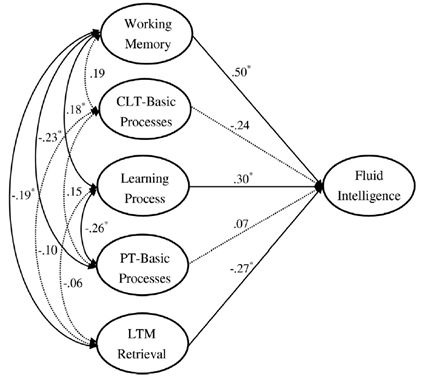Fluid intelligence (Gf) reflects the ability to reason and to solve problems in novel situations where prior experience and acquired knowledge are of no help. Gf has been considered as one of the most important factors in learning and the acquisition of crystallized abilities. During the last two decades, a large body of studies has been dedicated to exploring the cognitive underpinnings of Gf. For example, a seminal study conducted by Carpenter, Just, and Shell (1990) suggests that two factors may be essential in solving Raven's Matrices (a golden standard test of Gf): the ability to acquire and apply the rules, and working memory capacity (WMC, Wang et al., 2013; 2015). Meanwhile, the process of selectively retrieving relevant information (e.g., the appropriate rules) from long-term memory is also crucial (Unsworth & Engle, 2007). Due to the large overlaps between WMC, rule learning and retrieval, it remains unclear whether the contribution of learning and retrieval processes to Gf is unique or merely due to the variance that is shared with WMC.
A recent study conducted by Dr. Wang and his colleagues was published on INTELLIGENCE. In this research, they attempted to achieve a relatively purified representation of rule learning and retrieval processes and to examine whether they predict Gf beyond WMC. A sample of 220 university students completed a rule-based learning task, the Posner task, two WMC tasks and two Gf scales. Fixed-links models (see Ren, Wang, & Schweizer, 2017 for a review) were used to separate the core processes representing learning and retrieval from the auxiliary processes and to link them with Gf. Results showed that the learning and retrieval processes contributed significantly to Gf (r = 0.38 and −0.35 respectively). More importantly, both learning and retrieval processes were still predictive of Gf when WMC was controlled for. These results suggest that the ability to learn abstract rules and the efficiency of retrieving information from long-term memory are two essential components underlying Gf in addition to WMC (see Fig. 1 below).

Fig. 1 The prediction of Gf by WMC, learning, and long-term memory retrieval
The INTELLIGENCE journal is one of top journals publishing research associated with intelligence, with a five-year impact factor of 3.385 classified into JCR-Q1 in Psychology, multidisciplinary area. Dr. Wang’s group is especially interested in uncovering the mechanisms underlying individual differences of higher-order cognitive functions such as working memory, intelligence, learning and creativity. A series of his research findings has been published on prestigious journals.
Wang, T., Ren, X., & Schweizer, K. (2017). Learning and retrieval processes predict fluid intelligence over and above working memory. Intelligence, 61, 29-36.
Related readings:
Ren, X., Wang, T., Sun, S., Deng, M., & Schweizer, K. (2018). Speeded testing in the assessment of intelligence gives rise to a speed factor. Intelligence, 66, 64-71.
Wang, T., Ren, X., Schweizer, K., & Xu, F. (2016). Schooling effects on intelligence development: Evidence based on national samples from urban and rural China. Educational Psychology, 36, 831–844.
Wang, T., Ren, X., Li, X., Schweizer, K. (2015). The modeling of temporary storage and its effect on fluid intelligence: Evidence from both Brown-Peterson and complex span tasks. Intelligence, 49, 84–93.
Wang, T., Ren, X., & Schweizer, K. (2015). The contribution of temporary storage and executive processes to category learning. Acta psychologica, 160, 88–94.
Wang, T., Ren, X., Altmeyer, M., & Schweizer, K. (2013).An account of the relationship between fluid intelligence and complex learning in considering storage capacity and executive attention. Intelligence, 41, 537–545.
Xuezhu Ren, Tengfei Wang, & Schweizer Karl (2017). The fixed-links model and its applications in cognitive psychology research, Advances in Psychological Sciences (Chinese), 25, 1675-1681.



